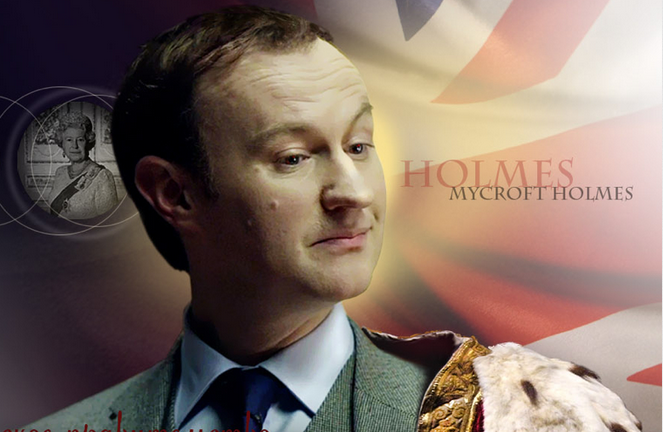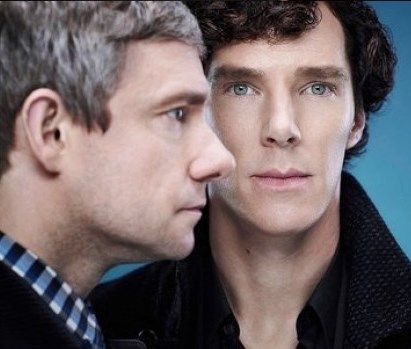
BBC Sherlock Fan Forum - Serving Sherlockians since February 2012.
- a sherlock holmes fan
- Shooting The Wall
 Offline
Offline - Registered: January 1, 2013
- Posts: 10
Re: An analysis on Sherlock
hello everyone
how are you?
i read all of your reviews and i loved them, and i am excited to reply, and to be honest i am writing this while i am eating my pizza ![]() , because this is what literature is about, we talk about reviews and we discuss them, we agree, we disagree, we share our thoughts about visual literature, audio literature or even written literature. and i am happy to have this discussion with such well educated gentlemen, or ladies.
, because this is what literature is about, we talk about reviews and we discuss them, we agree, we disagree, we share our thoughts about visual literature, audio literature or even written literature. and i am happy to have this discussion with such well educated gentlemen, or ladies.
and i would LOVE to thank Kazza as well as everyone who gave me their reviews, and to Kazza, i welcome your "attacks" with an open heart and open arms, because, you are right, this is a forum we should express our thoughts, and in this case about our writings that include Sherlock, the original Sherlock Holmes, or any other subject related to literature or crime fiction, and when you look at it it's a win-win situation, i get more experience, and you get to share your knowledge with all of us ![]()
NOW, lets talk literature. ![]()
i will divide my comment into three categories
those who talked about Sherlock's life (friendship)
those who talked about Sherlock's faith
and one more thing that i would like to say
1- those who talked about Sherlock's life
in the comments some said that Sherlock is loved and respected by a lot of people including John,Mrs. Hudson, Molly, and the inspector.
i agree with you, but please remember what i said Sherlock is respected but not liked, but as the series develops we can see that his social skills gets better and better, and his relationship with John gets stronger and stronger.
remember what we see and the begging of the series, to more specific at episode 1, we see Sherlock who owns a skull as his only friend.
that means that he does need company, and when John steps into the scene the skull impotence has ether decreased, or it has no impotence at all.
as for being miserable,again, i agree, but lets take another look at the first episode, we see Sherlock who is working from the very first start of the series, now this gave me a number of questions:
what does he do in his free time?
does he even have a free time?
and where does he go?
if we were talking about the original Sherlock Holmes then i would say
he will enjoy a quiet moment with himself as he takes a 7% solution of cocaine when he is free.
but, this is a different universe, where cocaine is illegal, so what does he do, he tries to create a working environment for his powers.
in the begging work is all that Sherlock has, and when John steps in, we see that he likes to talk with him.
so is he miserable?
to Sherlock no, but for an average person yes.
what do i mean?
if it was a normal person who works all the time his, and has no friends, his life would be miserable
but as we know Sherlock is not a normal man, what we call miserable is his heaven.
and when John comes to the scene, he remains to enjoy his work, and in his free time he likes to talk with John
2- those who talked about Sherlock's faith
now when i asked about if Sherlock is an atheist i didn't mean anything, it was a normal question by your friendly neighbor.
and if i upset someone then i apologize.
now some one wrote in his comment a third choice that said that Sherlock was just telling facts.
this is 100% true, why?, because this is another way to look at it.
as i said before when we talk about serious subjects like this we will interpret them in many different ways, based on our background and culture.
and for the gentlemen who said that the phrases don't tell us anything about Sherlock's background
then i agree with you as well, because this is my point and this is what i said these phrases can mean nothing or everything.
it all depends on how we look at it and how the craters build Sherlock.
and just like i said before, when it comes to subjects like this only the writers or creates know the answer.
and one more thing about this subject.
there is a reference about this subject in the cannon.
to be specific. in his last bow, i think its in the end.
where Sherlock Holmes says "theres is a storm coming" and then he says"its God's wind" which shows us that he is a believer
3- one more thing
at the end i would like to say all i have written and the analysis that i gave was all part of my own interpretation of the Sherlock series.
and that this is one of many analysis of Sherlock because thats what the title says
"An analysis on Sherlock", and i hope i didn't upset anyone with it.
and at last i have something that i wanted to say
since i joined the forum i noticed an interest about whether am i a native speaker or not
i will let you decide
i will show you a video with me in it and you make the decision
please follow this link to know me better
and please don't say my name, because its our little secret ![]()
and finally i would like to thank you all and please comment on this reply
thank you
- besleybean
- Threatened Knighthood
 Offline
Offline 
- From: Carnoustie, Angus, Scotland.
- Registered: October 4, 2012
- Posts: 21,376
Re: An analysis on Sherlock
Ok taking your post piece by piece again.
Of course you are right in the picture you paint of Sherlock when we 1st meet him: he's obviously alone, awkward and has a reputation for being difficult. Yet he was already getting known for his good work.
The stage we are at pre-fall, or at the fall: Mrs H seems like a mother figure to Sherlock, John is his best friend, Lestrade and Molly trusted colleagues.
On the work thing, I think Sherlock is a workaholic.
On faith: I'm more inclined to think Canon Sherlock Holmes was Christian.
As for BBC Sherlock, it is purely my opinion that I think he is atheist. But it is possibly something we will never be told.
---------------------------------------------------------------------------------------------------------------------------------------------------------------
- kazza474
- High Functioning Sociopath
 Offline
Offline 
- From: Australia
- Registered: February 9, 2012
- Posts: 2,845
Re: An analysis on Sherlock
Piece by piece ( you really should consider smaller posts, addressing one issue at a time maybe? People tend to steer clear if there's too much in a single post. Just a suggestion, not an order.)
a sherlock holmes fan wrote:
we see Sherlock who owns a skull as his only friend.
Flawed assumption.
No, we see Sherlock who uses a skull when he wants to verbalise his thoughts in an effort to make things more clearer to him. There is nothing to suggest that the skull is considered by Sherlock to be his friend or companion.
Having 'someone or something' to talk to/at is not what defines a friendship. To use that definition, he talks to Mrs Hudson, he talks to Lestrade, he talks to Mycroft, he talks to Mike Stamford.
____________________________________________________________________________________________
Also, please note that sentences can also end in full stops. The exclamation mark can be overused.
Sherlock Holmes 28 March 13:08
Mycroft’s popularity doesn’t surprise me at all. He is, after all, incredibly beautiful, clever and well-dressed. And beautiful. Did I mention that?
--Mark Gatiss
"I know that you believe you understand what you think I said, but I’m not sure you realize that what you heard is not what I meant."
Robert McCloskey
- a sherlock holmes fan
- Shooting The Wall
 Offline
Offline - Registered: January 1, 2013
- Posts: 10
Re: An analysis on Sherlock
in the first episode
when Sherlock and John enter the flat
Sherlock tells John that the skull is a friend,"i call it a friend"
- •
- Mattlocked
- One More Miracle
 Offline
Offline 
- From: Germany
- Registered: June 29, 2012
- Posts: 6,781
Re: An analysis on Sherlock
And he takes it back a second later. ![]()
__________________________________
"After all this time?" "Always."
Good bye, Lord Rickman of the Alan
- a sherlock holmes fan
- Shooting The Wall
 Offline
Offline - Registered: January 1, 2013
- Posts: 10
Re: An analysis on Sherlock
Sherlock season 1, episode 1
John: that's a skull
Sherlock: a friend of mine (1 second later) well i say friend
- •
- Mattlocked
- One More Miracle
 Offline
Offline 
- From: Germany
- Registered: June 29, 2012
- Posts: 6,781
Re: An analysis on Sherlock
Exactly. To me it sounded quite ironic. "Well I say friend....."
= "Well I say friend.... of course he isn't a friend.... I don't have friends". Something like that.
But maybe I just translated wrong.
__________________________________
"After all this time?" "Always."
Good bye, Lord Rickman of the Alan
- besleybean
- Threatened Knighthood
 Offline
Offline 
- From: Carnoustie, Angus, Scotland.
- Registered: October 4, 2012
- Posts: 21,376
Re: An analysis on Sherlock
Your translation is accurate.
---------------------------------------------------------------------------------------------------------------------------------------------------------------
- kazza474
- High Functioning Sociopath
 Offline
Offline 
- From: Australia
- Registered: February 9, 2012
- Posts: 2,845
Re: An analysis on Sherlock
a sherlock holmes fan wrote:
where Sherlock Holmes says "there's is a storm coming" and then he says"its God's wind" which shows us that he is a believer
See again I don't think this shows us anything really. In that day & age it was a common term to use.
Today, I would wager that nearly all English speaking people will say " Goodbye" several times a day. Now the origin of the word "goodbye" is simply this - it is a shortened form of 'God be with you'. So using your reasoning, if we are all saying 'God be with you' several times a day, we're all devout Christians to the core!
And I can assure you, that is in no way the case. There are many other examples of this type of phrase being the normal speech in an English speaking society, some words generating from Christian belief, some from other religion but all used in a totally different context as the word was originally used.
This is a world that thrives on convenience; the words are there, we use them without giving their meanings/roots a second thought.
Now being on staff, I was well aware of your ethnicity but could not say anything unless you revealed something about yourself. Now that you have, I believe that you are in a society that is far more embedded in religious beliefs of all kinds than many English speaking societies and value faith far more than 'we' do as a whole (I am well aware that this is a generalisation but one I believe is based on fact) So naturally you would look at these things slightly different & may not understand how we 'butcher' the English language & use words that were not intended to be used as we do.
____________________________________________________________________________________________
Also, please note that sentences can also end in full stops. The exclamation mark can be overused.
Sherlock Holmes 28 March 13:08
Mycroft’s popularity doesn’t surprise me at all. He is, after all, incredibly beautiful, clever and well-dressed. And beautiful. Did I mention that?
--Mark Gatiss
"I know that you believe you understand what you think I said, but I’m not sure you realize that what you heard is not what I meant."
Robert McCloskey
- equiraptor
- Lestrade's Aide
 Offline
Offline - Registered: December 7, 2012
- Posts: 84
Re: An analysis on Sherlock
kazza474 wrote:
See again I don't think this shows us anything really. In that day & age it was a common term to use.
Today, I would wager that nearly all English speaking people will say " Goodbye" several times a day. Now the origin of the word "goodbye" is simply this - it is a shortened form of 'God be with you'. So using your reasoning, if we are all saying 'God be with you' several times a day, we're all devout Christians to the core!
And I can assure you, that is in no way the case. There are many other examples of this type of phrase being the normal speech in an English speaking society, some words generating from Christian belief, some from other religion but all used in a totally different context as the word was originally used.
This is a world that thrives on convenience; the words are there, we use them without giving their meanings/roots a second thought.
"Bless you" after someone sneezes is another example. That tradition is rooted deeply in religion, yet when someone sneezes in my heavily-atheist workplace, there are cries of "Bless you!" from across the room.
Frankly, I think the question of Sherlock's religion is something that would earn, at most, a "BORED!" from him, speaking about the BBC series. "The personal beliefs of Sherlock" are even less significant to Sherlock than the layout of the solar system. Religion and belief systems are only of interest to him in how they impact others' decisions, how they help him solve puzzles. They have no relevance on a personal level.
- a sherlock holmes fan
- Shooting The Wall
 Offline
Offline - Registered: January 1, 2013
- Posts: 10
Re: An analysis on Sherlock
hello again
happy to see you all again ![]()
now, as for "i's God's wind"
you are right, at that time Christian words were "popular" ,
but, here is a question for you:
why did he say "its' God's wind" why didn't he say "its a strong wind" or "its a heavy wind"
now Conan Doyle was not a Christian, he was into spiritualism, in fact, he criticized organized religion in the very first Sherlock Holmes story "A Study in Scarlet" and we don't see any refinance to religion until the last stories at the canon, and he put his character as a believer of a higher power and the words "its God's wind non the less", and there is another example, in one of the stories in the canon, in the begging of the story, Sherlock Holmes was on his way to the chapel. why? we dont know, maybe he converted to Christianity before he died, maybe he didn't want any problems with the church, maybe there is another reason that we don't know.
and i asked about it after reading the story, because i was surprised that he mentioned religion at the end of his stories, and i was told that he and Watson beloved in a higher power, this is for the canon
as for Sherlock, then like i said there is no prof that he is an atheist or that he is a religions man,
this all comes to how interpret what we see or read.
thank you ![]()
Last edited by a sherlock holmes fan (January 6, 2013 8:46 am)
- •
- besleybean
- Threatened Knighthood
 Offline
Offline 
- From: Carnoustie, Angus, Scotland.
- Registered: October 4, 2012
- Posts: 21,376
Re: An analysis on Sherlock
There can certainly be a valid case made for discussing Doyle's religious views and possibly even the role of religion in the Sherlock Holmes stories.
But I will be surprised to see if we have much religion in BBC Sherlock...and personally I hope we don't.
---------------------------------------------------------------------------------------------------------------------------------------------------------------
- kazza474
- High Functioning Sociopath
 Offline
Offline 
- From: Australia
- Registered: February 9, 2012
- Posts: 2,845
Re: An analysis on Sherlock
"Its God's wind none the less" - just meant that it's a wind that nature always brings at that time of year. Why choose that word over others? As you've said yourself, that's just the way they talked back then. Yes religion was more 'visible' in society then, yes it was usual that people of that class went to church as it was 'the done thing'. It was more about mixing with one's own class rather than being there as a devout follower.
Sherlock Holmes had the kind of schooling where religion was strictly taught 'as rote' rather than it being an instruction on religion.
We'll agree to disagree on this point; I cannot believe there is any valid reason for a deliberate mention of religion in the canon.
____________________________________________________________________________________________
Also, please note that sentences can also end in full stops. The exclamation mark can be overused.
Sherlock Holmes 28 March 13:08
Mycroft’s popularity doesn’t surprise me at all. He is, after all, incredibly beautiful, clever and well-dressed. And beautiful. Did I mention that?
--Mark Gatiss
"I know that you believe you understand what you think I said, but I’m not sure you realize that what you heard is not what I meant."
Robert McCloskey
- a sherlock holmes fan
- Shooting The Wall
 Offline
Offline - Registered: January 1, 2013
- Posts: 10
Re: An analysis on Sherlock
"We'll agree to disagree on this point"
i agree
our opinions differ when it comes to this subject
i still hope we can be friends
- •
- SusiGo
- The game is never over (moderator)
 Offline
Offline 
- From: Germany
- Registered: June 5, 2012
- Posts: 22,965
Re: An analysis on Sherlock
I was just reading the story "The illustrious client" and came upon this quote. Holmes talks about a villain whose female victim just disfigured him with vitriol:
"The wages of sin, Watson - the wages of sin", said he. "Sooner or later it will always come. God knows, there was sin enough".
This sounds like a Christian concept of divine retribution. But I can't see "our" Sherlock saying such a thing.
------------------------------
"To fake the death of one sibling may be regarded as a misfortune; to fake the death of both looks like carelessness." Oscar Wilde about Mycroft Holmes
"It is what it is says love." (Erich Fried)
“Enjoy the journey of life and not just the endgame. I’m also a great believer in treating others as you would like to be treated.” (Benedict Cumberbatch)

- besleybean
- Threatened Knighthood
 Offline
Offline 
- From: Carnoustie, Angus, Scotland.
- Registered: October 4, 2012
- Posts: 21,376
Re: An analysis on Sherlock
I again would just see this as use of common, cultural language.
Although once again, this is canon Holmes and not BBC Sherlock.
---------------------------------------------------------------------------------------------------------------------------------------------------------------
- ancientsgate
- Reichenbach Survivor
 Offline
Offline 
- From: New Hampshire, USA
- Registered: June 8, 2012
- Posts: 5,532
Re: An analysis on Sherlock
SusiGo wrote:
I was just reading the story "The illustrious client" and came upon this quote. Holmes talks about a villain whose female victim just disfigured him with vitriol:
"The wages of sin, Watson - the wages of sin", said he. "Sooner or later it will always come. God knows, there was sin enough".
This sounds like a Christian concept of divine retribution. But I can't see "our" Sherlock saying such a thing.
Karma, as they say, is a boomerang. What goes around, comes around. It's not necessary to phrase it in Biblical scriptural words, the way ACD had his Sherlock do, but I think most of us would agree (and hope!) that those who sow seeds of evil will eventually reap the same in their own life. But yeah, I don't think TPTB of the BBC Sherlock will go there with their Sherlock. Nowadays it's not considered PC to talk about your spiritual life or lack of it. (In spite of the fact that we do get into it a bit here on this forum, lol).
- KeepersPrice
- Official Blogger
 Offline
Offline 
- From: Andover, Massachusetts
- Registered: June 8, 2012
- Posts: 1,721
Re: An analysis on Sherlock
Just throwing in a comment on the religion discussion - we see in the last scene of S2/E3, that Sherlock's burial plot seems to be in some sort of traditional churchyard cemetary. It's hard to see, but I think there's a cross on the church and there are definitely crosses and angel statues in the cemetary - not that this necessarily means anything or says anything about Sherlock's personal beliefs or religion. Merely, it might have been the expected place for a member of the Holmes family to have been laid to rest; or that all the arrangements were made courtesy of tradition-bound (at least on the surface) Mycroft. So again, it's not conclusive; however, I personally find it quite definitive that Sherlock does not believe in an after-life when we hear him pronounce that "people don't go to heaven."
---------------------------------------------------------------------------------------------------------------------------------------------
And I said "dangerous" and here you are.
You. It's always you. John Watson, you keep me right.

- besleybean
- Threatened Knighthood
 Offline
Offline 
- From: Carnoustie, Angus, Scotland.
- Registered: October 4, 2012
- Posts: 21,376
Re: An analysis on Sherlock
That line, to me, is everything.
---------------------------------------------------------------------------------------------------------------------------------------------------------------
- ancientsgate
- Reichenbach Survivor
 Offline
Offline 
- From: New Hampshire, USA
- Registered: June 8, 2012
- Posts: 5,532
Re: An analysis on Sherlock
KeepersPrice wrote:
Just throwing in a comment on the religion discussion - we see in the last scene of S2/E3, that Sherlock's burial plot seems to be in some sort of traditional churchyard cemetery. It's hard to see, but I think there's a cross on the church and there are definitely crosses and angel statues in the cemetery - not that this necessarily means anything or says anything about Sherlock's personal beliefs or religion. Merely, it might have been the expected place for a member of the Holmes family to have been laid to rest; or that all the arrangements were made courtesy of tradition-bound (at least on the surface) Mycroft. So again, it's not conclusive; however, I personally find it quite definitive that Sherlock does not believe in an after-life when we hear him pronounce that "people don't go to heaven."
It looks like an old Anglican burying ground, right next to the local stone church. Isn't that a similar cemetery, in "Hounds", when he and John had the morning-after discussion? I assume such cemeteries are common in the British countryside.
I did sit and wonder who took care of the arrangements, but of course Mycroft is the obvious answer.
It probably would have been too expensive and/or complicated to do, but I would have loved it if there'd been a huge HOLMES mausoleum type of granite edifice, and if he'd been in there-- as you said, KP, the family burial vault. I also wanted dates on the headstone. Sigh.... I think it's time for me to get TRF out again and rewatch; it's been a while. "Dont. Be. Dead."
Anyway, back on topic, people who believe in absolutely nothing are buried in sacred ground all the time, so what kind of cemetery he was put in was IMO no statement on faith or lack of it.

